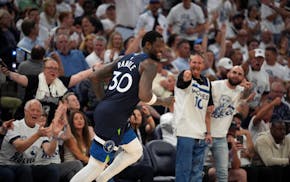Martin Jarmond stopped at a Los Angeles-area grocery store on his way home from work recently. He was wearing a UCLA shirt with the Big Ten logo on it.
A customer wearing a Michigan shirt approached the UCLA athletic director.
"Hey, welcome to the Big Ten," the man said.
The Michigan fan told Jarmond that he hadn't seen a UCLA-in-the-Big Ten shirt until then.
Like moving to a new neighborhood, major life changes take some time to process and absorb.
The Gophers will bring over some hot dish Saturday when they play UCLA at the Rose Bowl in a conference game held in October. That still sounds somewhat odd to say, but the earth has shifted swiftly throughout college sports.
"You do have to modernize; you can't romanticize," Jarmond said, "because college athletics are not the same. It's not the same as it was even three years ago."
In other words, romanticism doesn't pay the bills.
Jarmond, 44, understands the value of change better than most. He was hired to lead UCLA's athletic department in May 2020, soon after the start of the pandemic.
A month later, Under Armour terminated a $280 million sponsorship agreement with the school, a record apparel deal for an athletic department at the time. The sides were four years into the 15-year pact.
Lost revenue from the pandemic and Under Armour contract contributed to a financial mess that the Pac-12′s TV payouts could not fix. The athletic department's debt topped $100 million, according to the Los Angeles Times.
"You're worried about everything," Jarmond said.
The Big Ten tossed the Bruins a life preserver.
The red-carpet invitation into the Big Ten gave both sides something they coveted: The Big Ten's footprint expanded into the Los Angeles market by adding a pair of historical brands in UCLA and USC.
UCLA received financial stability from the conference's massive media rights package that was far superior to the Pac-12′s guarantee.
The Bruins long served as a flagship entity for the Pac-12, but the financial pressures that every athletic department faces — and helped create through unrestrained spending — in the new reality of college sports override sentiment and loyalty.
"You have to be dynamic and adaptable or else you're going to fall behind significantly," Jarmond said. "If you're too tied to the past from a standpoint of where things are going, you're not going to be as competitive as you need to be. And your brand is not going to be what it should be, quite honestly. You've got to change with the times."
Jarmond said he began thinking about realignment options in 2021 after Texas and Oklahoma announced their intentions to withdraw from the Big 12 to move to the SEC.
Jarmond previously spent 15 years combined between Michigan State and Ohio State in athletic department executive positions, so he had familiarity with the inner workings of the conference. The Power Five was being incrementally reduced to the Towering Two — Big Ten and SEC — in financial wherewithal, and that gap figured only to grow wider.
"You really had to pay attention to what was going on," Jarmond said. "It was a pretty seismic, chaotic time in this business. Texas and Oklahoma leaving the Big 12 kind of opened peoples' eyes, but if you had been watching, I'm sure people had to be thinking about their future."
The Big Ten's geographic footprint and TV reach benefit not only the school, Jarmond said, but UCLA's athletes as well in the name, image and likeness business realm. More exposure provides better opportunities for athletes to build individual brands.
Jarmond noted that the football team already has had games televised by CBS, NBC, ABC and Fox this season.
"We want to be able to showcase our student-athletes on a larger scale and a national scale," he said.
Yes, but money was the main enticement. Jarmond took over a department facing significant debt. Clinging to nostalgia wasn't going to solve the problem.
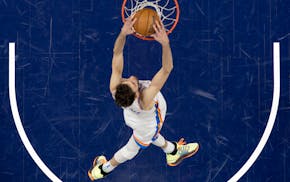
Scoggins: Chet Holmgren's in the right place at the right time
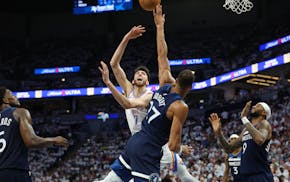
Chet Holmgren remains a basketball unicorn, a status forged in Minnesota and on display in the NBA
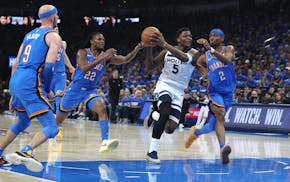
Scoggins: Three observations from the Timberwolves' Game 2 loss
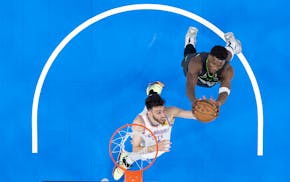
Scoggins: Three observations from the Timberwolves' Game 1 loss
